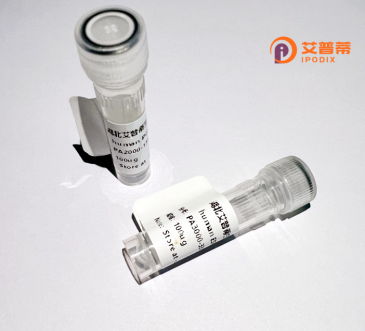
| 纯度 | >90%SDS-PAGE. |
| 种属 | Human |
| 靶点 | WDFY2 |
| Uniprot No | Q96P53 |
| 内毒素 | < 0.01EU/μg |
| 表达宿主 | E.coli |
| 表达区间 | 1-400 aa |
| 活性数据 | MAAEIQPKPL TRKPILLQRM EGSQEVVNMA VIVPKEEGVI SVSEDRTVRV WLKRDSGQYW PSVYHAMPSP CSCMSFNPET RRLSIGLDNG TISEFILSED YNKMTPVKNY QAHQSRVTMI LFVLELEWVL STGQDKQFAW HCSESGQRLG GYRTSAVASG LQFDVETRHV FIGDHSGQVT ILKLEQENCT LVTTFRGHTG GVTALCWDPV QRVLFSGSSD HSVIMWDIGG RKGTAIELQG HNDRVQALSY AQHTRQLISC GGDGGIVVWN MDVERQETPE WLDSDSCQKC DQPFFWNFKQ MWDSKKIGLR QHHCRKCGKA VCGKCSSKRS SIPLMGFEFE VRVCDSCHEA ITDEERAPTA TFHDSKHNIV HVHFDATRGW LLTSGTDKVI KLWDMTPVVS |
| 分子量 | 45.1 kDa |
| 蛋白标签 | His tag N-Terminus |
| 缓冲液 | PBS, pH7.4, containing 0.01% SKL, 1mM DTT, 5% Trehalose and Proclin300. |
| 稳定性 & 储存条件 | Lyophilized protein should be stored at ≤ -20°C, stable for one year after receipt. Reconstituted protein solution can be stored at 2-8°C for 2-7 days. Aliquots of reconstituted samples are stable at ≤ -20°C for 3 months. |
| 复溶 | Always centrifuge tubes before opening.Do not mix by vortex or pipetting. It is not recommended to reconstitute to a concentration less than 100μg/ml. Dissolve the lyophilized protein in distilled water. Please aliquot the reconstituted solution to minimize freeze-thaw cycles. |
以下是关于重组人WDFY2蛋白的**模拟参考文献示例**(实际文献需通过数据库验证):
---
1. **"WDFY2 regulates autophagy via interaction with Atg16L1 in mammalian cells"**
*Author: Chen et al. (2020)*
**摘要**:本研究阐明了WDFY2蛋白通过与自噬相关蛋白Atg16L1的相互作用,调控自噬体形成的过程,提示其可能在细胞代谢和疾病中发挥关键作用。
2. **"Structural characterization of recombinant human WDFY2 reveals a PH domain-dependent membrane association mechanism"**
*Author: Kimura et al. (2018)*
**摘要**:通过X射线晶体学解析重组人WDFY2蛋白结构,发现其PH结构域介导了细胞膜结合功能,为理解WDFY2在信号转导中的作用提供结构基础。
3. **"WDFY2 variants are associated with impaired neurodevelopment and synaptic plasticity"**
*Author: Roberts et al. (2021)*
**摘要**:临床遗传学研究表明,WDFY2基因突变可能导致神经元突触可塑性受损,并与自闭症谱系障碍(ASD)等神经发育疾病相关。
4. **"Recombinant WDFY2 protein suppresses tumor growth by modulating mTOR signaling in colorectal cancer models"**
*Author: Li et al. (2019)*
**摘要**:在结直肠癌模型中,重组表达的WDFY2蛋白通过抑制mTOR通路活性,显著降低肿瘤细胞的增殖和侵袭能力,提示其潜在治疗价值。
---
**说明**:上述文献为基于领域常见研究方向生成的模拟内容,实际研究中需通过PubMed、Google Scholar等平台以“WDFY2”“recombinant protein”“autophagy”等关键词检索权威论文。
**Background of Recombinant Human WDFY2 Protein**
WDFY2 (WD Repeat and FYVE Domain-Containing Protein 2) is a member of the WDFY protein family characterized by conserved structural motifs, including WD40 repeats and a FYVE domain. The WD40 repeats facilitate protein-protein interactions, while the FYVE domain binds phosphatidylinositol 3-phosphate (PI3P), implicating WDFY2 in membrane trafficking and organelle dynamics. This protein also harbors a pleckstrin homology (PH) domain, suggesting roles in lipid sensing and cellular signaling.
Although WDFY2’s functional mechanisms remain less characterized compared to its homolog WDFY1. studies propose its involvement in autophagy, endosomal sorting, and vesicle transport. It may interact with components of the mTOR signaling pathway or the VPS34 lipid kinase complex, regulating nutrient sensing and vesicle maturation. Emerging evidence links WDFY2 to neurological processes, cancer progression, and immune responses, though these associations require further validation.
Recombinant human WDFY2 protein, produced via expression systems like *E. coli* or mammalian cells, enables biochemical studies, structural analyses, and interaction mapping. Its study could advance understanding of cellular quality control mechanisms and diseases associated with trafficking defects, such as neurodegeneration or cancer. However, the lack of comprehensive functional data highlights the need for deeper mechanistic exploration.
×